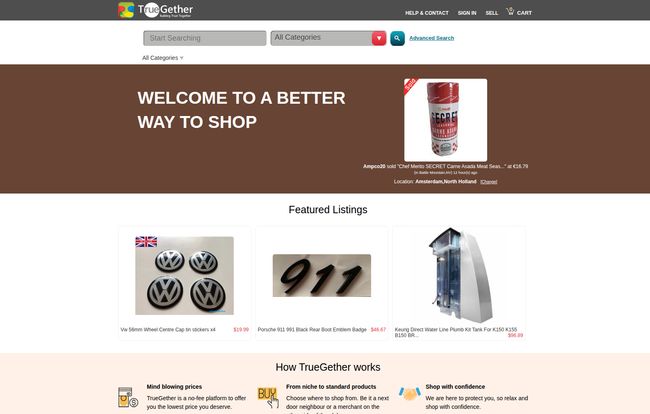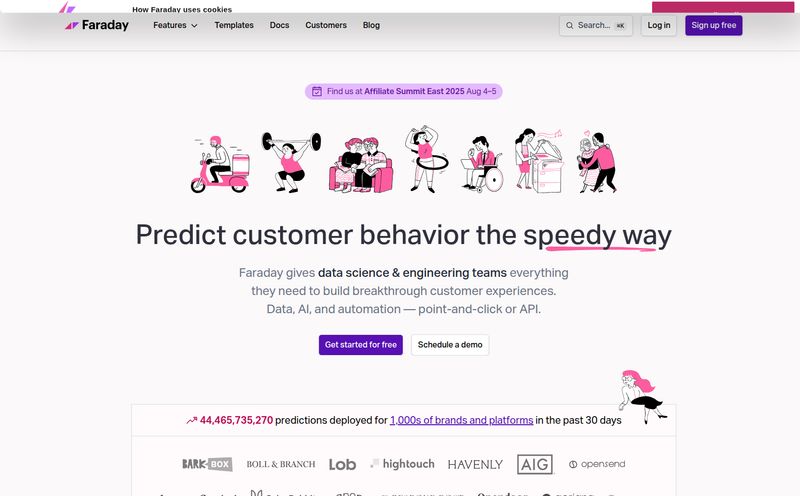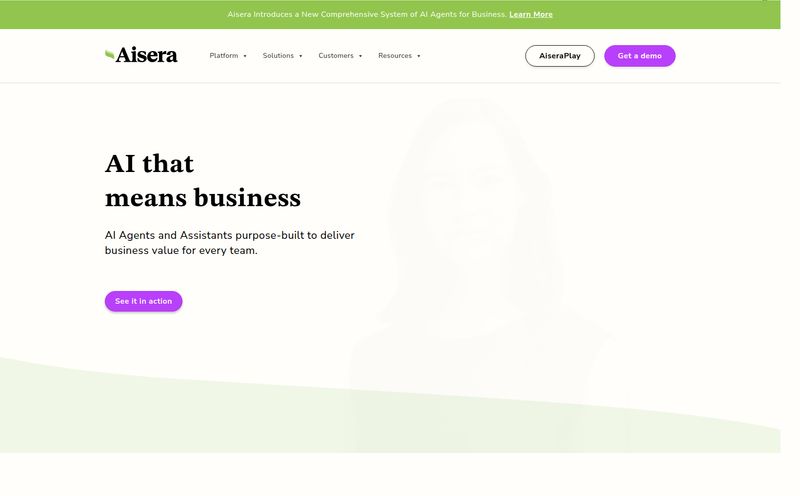If you've sold anything online in the last decade, you know the feeling. You make a great sale, you're riding high... and then you see the fee report. A little slice here for the listing, a bigger chunk there for the final value, maybe an extra sliver for using their payment processor. It feels like a death by a thousand paper cuts, doesn't it?
I've been in the SEO and traffic game for years, and I've watched countless sellers build amazing businesses on platforms like eBay and Shopify. But I've also seen them get squeezed. Every year, it seems like there's a new fee structure, a new mandatory ad program, a new hoop to jump through. So when a platform pops up on my radar screaming "NO FEES," my inner skeptic and my inner optimist get into a fistfight.
That platform is TrueGether. It calls itself a no-fee alternative to the big guys, packed with AI smarts. But is it too good to be true? Or is it the breath of fresh air we've all been waiting for? I decided to roll up my sleeves and take a proper look.
So, What Exactly Is TrueGether Supposed to Be?
At its heart, TrueGether is an online marketplace. You list stuff, people buy it. Simple enough. But its main sales pitch, its reason for existing, is to be a direct challenger to the fee-heavy models of eBay and, to some extent, the monthly subscription model of Shopify. It's built for both individuals clearing out their closets and for small businesses looking for a more cost-effective sales channel. They tout themselves as being fully automated and AI-empowered, which are buzzwords I hear a lot, but sometimes... just sometimes, there's fire behind the smoke.
The whole vibe of the site is... straightforward. It's not as slick as some of the billion-dollar competitors, and that's not necessarily a bad thing. It feels more like a tool built for function over form, which many sellers might actually prefer.

Visit TrueGether
The Fee Structure That Made Me Look Twice
This is the part that matters. This is why we're all here, right? The money. TrueGether's approach to pricing is a genuine head-turner in today's market. They've split their offering into two very distinct plans.
The "Wait, Really?" Free Plan
I had to read this a few times. The standard plan on TrueGether is, well, free. And I don't mean 'free trial' free or 'free with a million asterisks' free. I mean:
- $0 per month.
- $0 per listing.
- 0.0% fee per sale.
- Unlimited listings.
You read that right. You can list as many items as you want and when one sells, you keep all the money from the sale (minus whatever your payment processor, like PayPal, charges). For anyone starting out, or for sellers with low-margin items, this is massive. The ability to list your entire inventory without worrying about racking up fees before you've even made a sale lowers the barrier to entry to practically zero.
The Premium Plan for Power Sellers
Okay, so how do they make money? This is where the Premium plan comes in. For $19 a month, you get everything in the free plan, plus a suite of tools designed to actively grow your sales. The catch? They take a 2.0% fee per sale. Now, before you balk at that, lets compare. eBay's final value fees can easily creep into the 13%+ range depending on the category. Suddenly, 2.0% looks pretty darn good.
Here’s what that $19 and 2% gets you:
- Google Shopping Ads Promotion: This is the big one. TrueGether will promote your products on Google Shopping. For anyone who's tried to set up a Merchant Center account and run their own Google Shopping campaigns, you know it can be a complex and expensive beast. Having the platform handle this is a huge value proposition.
- AI-Powered Advertising & Pricing: The platform runs dedicated ad campaigns for your listings and can even automate your pricing to maximize sales based on a return on investment (ROI) you set. This is intriguing. It's like having a little marketing robot working for you in the background.
Diving Into The Features: The Good and The... Quirky
A fee structure is just one part of the equation. A platform can be cheap as chips, but if it's a nightmare to use, what's the point?
The bulk upload functionality is a must-have, and I was glad to see it here. If you have hundreds or thousands of products, listing them one-by-one is a one-way ticket to madness. They do note, however, that inventory file uploads are limited to 10,000 active listings before you have to contact their support. It’s a bit of an odd ceiling, but for 95% of sellers, that's more than enough. It's just something to be aware of if you're a massive operation.
The AI-driven features on the Premium plan are where things get interesting. The idea of setting a desired ROI and letting an algorithm tweak your prices and run ads is the kind of automation that can free up a ton of time. I've seen similar tools offered as expensive third-party plugins for Shopify, so getting it included for $19/month is a pretty solid deal. I'm always a little wary of 'black box' AI, but if it moves product, who am I to argue?
They also push their Buyer Protection, which is table stakes these days. You need to give buyers confidence, and having a clear process for when things go wrong is critical for building a trustworthy marketplace.
So What's the Catch? Every Rose Has its Thorns
No platform is perfect, and it’s dishonest to pretend otherwise. I found a couple of things you should be aware of. The first is that 2.0% transaction fee on the Premium plan. It's low, yes, but it's not zero. The platform says you can set it as low as 2.0%, suggesting it might be higher depending on your Google Ads budget. It's a detail I'd want to clarify before jumping in. Transparency is everything.
Another minor point for the tech-heads: the site functionality relies on Javascript being enabled in your browser. In 2024, this is a non-issue for almost everyone, but it's a small technical dependency to note. It's not a dealbreaker, more of a fun fact.
Finally, while TrueGether has helped over 10,000 sellers, it doesn't have the colossal, built-in traffic of a giant like eBay. You might not see sales on day one. With the Premium plan, the Google Shopping integration is meant to solve this exact problem by bringing in outside traffic. But on the free plan, you might need to do a bit more of your own marketing to get the ball rolling. Think of it as a tradeoff: you save a ton on fees, but you might have to put in a little more sweat equity to drive your initial traffic. A fair bargain, in my opinion.
My Honest Take: Who is TrueGether Actually For?
After poking around, I think I have a good handle on this. TrueGether isn't necessarily going to make eBay obsolete overnight. But it carves out a very, very compelling niche.
It's perfect for:
- New Sellers: If you're just starting and the thought of fees is terrifying, the Free plan is a no-brainer. You can learn the ropes with zero financial risk.
- Sellers with Tight Margins: Selling items where every penny counts? A 0% sales fee is a game-changer.
- Businesses Looking for a Second Channel: If you're already on eBay or Amazon, why not sync your inventory to TrueGether's free plan? A sale there is a sale with no commission. It's a fantastic, risk-free way to diversify.
- Hands-Off Growth Hackers: For the seller who understands the power of advertising but hates managing it, the Premium plan is incredibly tempting. Let their AI and Google Shopping integration do the heavy lifting for a predictable fee.
It might be less ideal for someone who needs an enormous, built-in audience from day one and isn't willing to wait for the platform's external marketing (or their own) to kick in. But for most, the financial upside is just too significant to ignore.
Frequently Asked Questions About TrueGether
Is TrueGether really and truly free?
Yes, their basic plan is completely free. No monthly fees, no listing fees, and a 0% commission on sales. You only pay for the Premium plan if you want their advanced advertising and AI features.
How does TrueGether make money then?
Their revenue comes from the $19/month subscription fee and the 2.0% sales commission from users on their Premium plan. Their business model relies on providing enough value in the premium tools to encourage serious sellers to upgrade.
Is TrueGether safe to use for buyers and sellers?
They offer buyer protection and use secure, established payment methods like PayPal, Stripe, and Authorize.net. This provides a safety net for both parties, which is standard for any credible online marketplace.
Can I import my listings from another platform like eBay?
The site advertises bulk upload via inventory files (like CSVs), which is how most sellers would move between platforms. While they dont explicitly have a one-click "Import from eBay" button on their homepage, this file-based method is the standard way to do it. You'd export from eBay and format the file for TrueGether's system.
What is the biggest difference between TrueGether and eBay?
Fees. Plain and simple. The primary difference is TrueGether's 0% commission on its free plan, compared to eBay's much higher and more complex fee structure. The second biggest difference is audience size; eBay is larger, but TrueGether's premium tools aim to offset that by advertising on Google.
The Final Word on TrueGether
Look, I've seen platforms come and go. Most are just flashes in the pan. TrueGether feels different. It's not trying to be flashy; it's trying to be functional and, most importantly, fair. The value proposition is one of the strongest I've seen in the e-commerce space in a long time.
Giving sellers a chance to operate without constantly looking over their shoulder at commission fees is a powerful move. Will I be moving my entire operation over tomorrow? Maybe not. But will I be listing my entire inventory on their free plan to capture extra, zero-commission sales? You bet I will. And for anyone feeling the squeeze of ever-increasing fees, TrueGether isn't just an option—it’s a genuine opportunity.



